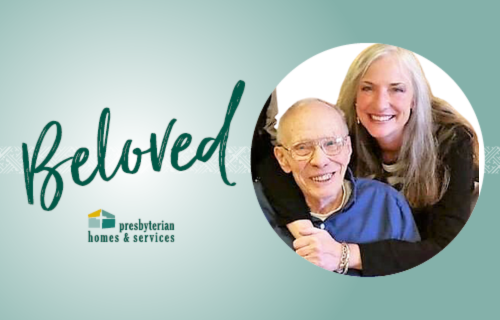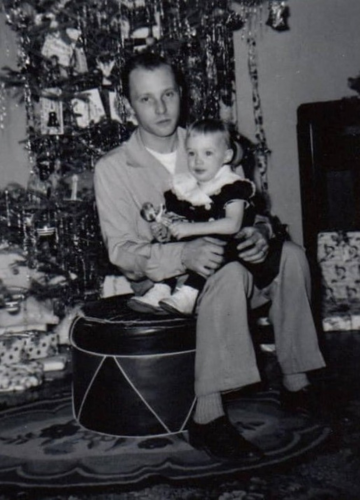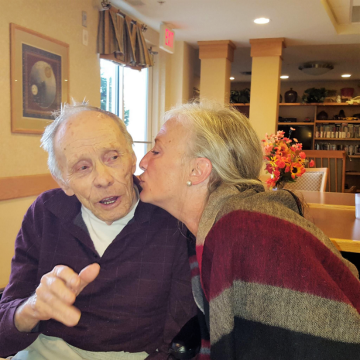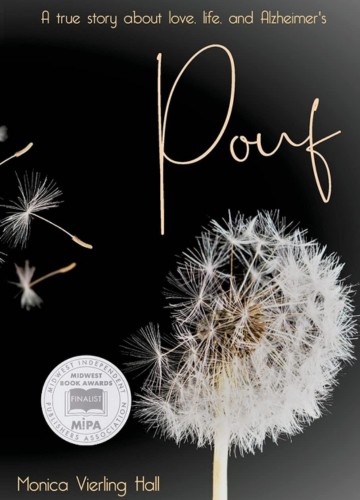Beloved series
 Real stories as told by people whose lives have been touched by the ministry of Presbyterian Homes & Services (PHS).
Real stories as told by people whose lives have been touched by the ministry of Presbyterian Homes & Services (PHS).
June is Alzheimer’s and Brain Awareness Month. Monica Vierling Halls shares her story to inspire others to cherish moments with loved ones, even as they face the challenges of Alzheimer’s or other forms of dementia.
Quotations in italics are from her book Pouf: A True Story About Love, Life, and Alzheimer’s published in 2020. Copies are available in libraries at all PHS memory care communities and for purchase online.
Monica’s story
“Give me back my dad!” I hiss. The words come through bared teeth and are choked out of a pinched throat in the stranglehold of utter despair.
From the opening lines of her book, author Monica Vierling Hall recounts that fateful day at the rehabilitation center in 2013.
Dad furrows an eyebrow, wondering what is causing his daughter so much distress. He is innocent. He has no idea his dementia took a nosedive because of the anesthesia he received during his hip surgery. …
I avoid meeting Dad’s eyes. I don’t want him to see the shattered truth in mine. I turn my back to him to hide my face, knowing full well that my heaving shoulders are giving me away. I continually swipe at the stream of heartbreak running from my eyes. …
In the days that followed, new truths came to light.
We couldn’t hide from it any longer. It was apparent Dad needed help. Quite honestly, we all needed help. … We’re forced to accept that Dad is not going home. And he is not going into assisted living. He will go directly into a memory care unit.
Understanding Dad’s need for a team of care
Years earlier Jerome, Monica’s dad, had asked her to promise that she would never bring him to an “old folks’ home” (in his words).
She promised — and so now she wrestled, often reflecting on the best of who he was.
 If I were to describe him, I would say he was the one who played checkers with us when we were kids.
If I were to describe him, I would say he was the one who played checkers with us when we were kids.
He would hit the ball in the backyard for us to learn how to field and catch.
He would play hide-and-seek with us while Mom made dinner. Sometimes he would lift us up and set us on the top shelf in the bedroom closet, tucking us in between Mom’s Sunday hats and gloves.
He taught me how to shoot marbles so I was a force to be reckoned with when I joined the Marble Team in school.
He taught me how to ride the turquoise Thunderbird bicycle I received for my First Communion. It even had cream-colored saddlebags strapped over the bucker in the back. (We called it a bucker because that’s where someone could hop on and buck a ride.) …
In whatever aspect your path crossed my dad’s, you were always guaranteed a “listener.” No one gave you their undivided attention as he did. You felt special. …
Seeing Monica’s struggle, a wise and gentle guide came alongside her to help.
He doesn’t know, though, my inner turmoil about putting him in a home and breaking my promise to him. A staff person from a different facility helped me come to grips with this.
“Monica,” she said, “you kept your promise. You did everything you could for him, as only one person can. He now requires a team. A nurse, a nutritionist, an OT, a PT, and so on. You were a good daughter.”
Accepting the reality that she could no longer do it alone gave Monica peace and reassurance about her dad’s move.
Continuing to foster deep connections
Soon Jerome settled into his new home in the memory care community called The Arbor at McKenna Crossing in Prior Lake, Minn.
Monica remembers those first visits with her husband — when feelings of despair turned to hope.
As soon as we open the door, and before we cross the threshold, we take off our Shoes of Normalcy. Only then do we enter the gentle World of Dementia. Here, Shoes of Normalcy are not needed. Here, the residents are soft souls. …
My visits to the Arbor keep me close to my dad’s heart.
A little hope sparked her imagination and a powerful new habit: with each visit, she began writing down on scraps of paper the sometimes funny, sometimes profound words her dad spoke.
“I love my life,” Dad says. “It’s perfect. I feel perfect. Except the words are up too far, and they just don’t come down to come out.” He gestures to his head, motions down his neck, and ends with his mouth.
And whenever words would fail him, Jerome communicated love with his eyes. After one visit he said:
“I have to say, I love you. That’s a big word, but I don’t lie. I love both of you.”
He pointed to his eyes, which start tearing up.
“And these don’t lie.”
He finished by saying, “I’ll be at your side forever.”
 A series of tender moments caused Monica to reflect on the meaning of this new chapter in life with her dad.
A series of tender moments caused Monica to reflect on the meaning of this new chapter in life with her dad.
We never really mentioned love when we were growing up. … I find it interesting that as much as he struggles to find words, he still fully understands and conveys love.
My eyes are often soft as his words spill through my being. My Dad bathes in the warmth of my eyes and I can see that he feels understood.
We’re building a connection that will forever resonate in both of us. …
“Dad, I just love you,” I say.
“That’s all I need,” he replies.
Simply enjoying one another’s presence was enough. And so was being caught up together in a community of love.
I see love at the Arbor. Dad and the other residents perhaps don’t know it by name, but they all hunger for love and recognize it when it approaches them. Their eyes light up when love greets them. Their eyes follow this visitor, this love, around the room.
Their eyes are flat, though, when someone greets them not out of love but out of obligation. They know love is more than a hurried visit, a pat on the back, and a “See you next week.”
Love is a magnet. Its force pulls you and draws you in. You cannot resist, nor do you want to.
Love melts fear.
Love comforts the lonely.
Love cannot be matched as it grounds the Alzheimer’s patient.
Love builds bridges over rivers of lost words and memories.
Monica’s advice to families
 By staying present and engaged with her father, Monica was able to maintain a loving relationship with him despite his declining cognitive abilities due to Alzheimer’s, a form of dementia. Her experience serves as a reminder to others to cherish the moments with their loved ones, even as they face the challenges of dementia.
By staying present and engaged with her father, Monica was able to maintain a loving relationship with him despite his declining cognitive abilities due to Alzheimer’s, a form of dementia. Her experience serves as a reminder to others to cherish the moments with their loved ones, even as they face the challenges of dementia.
Speaking with PHS recently, Monica says, “Family members don’t necessarily want to go visit their loved one, and I think it’s because they feel the loss of what was. But my perspective is: forget about what was, it’s about what is! This is what you have and rejoice and be glad you can walk this life with them.
I encourage family members to take that opportunity to find that relationship with their loved one. This is a time of connecting … you can still show them the love you’ve always shown them and treat them with respect and honor the position that they hold in your family.”
Read the complete story of Monica’s inspiring journey with her dad in Pouf: A True Story About Love, Life, and Alzheimer’s.
PHS supports families
We encourage families to participate in activities and support groups to improve communication and to cultivate stronger relationships with loved ones. Resources are available to families desiring to learn more about memory loss.
We also support families who are new to the journey of dementia. If you’re like Monica and caring for a person living with dementia, you might feel unsure where to start. We are here to listen and help you. Please contact us today for a personalized recommendation – or call us at 651-631-6100.
You can also explore online our memory care communities in Minnesota, Iowa and Wisconsin.



